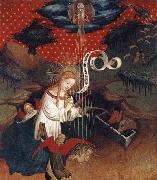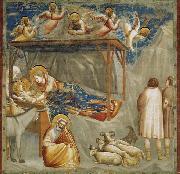Wholesale Oil Painting No Minimum |
|||||||||||
|
|
|||||||||||

|
|||||||||||
|
|
|
||||||||
Master FranckeGerman painter (early 15th century, active in Hamburg). respectively German for "Master Francke" and Latin for "Brother Francke", was a North German Gothic painter and Dominican friar, born ca. 1380 in the Lower Rhine region or possibly Zutphen in the Netherlands, who died ca. 1440, probably in Hamburg, where he was based at the end of his known career. He is called "Fratre Francone Zutphanico" ("Brother Frank of Zutphen") in one document. He may have trained as an illuminator and painter in France or the Netherlands, and later worked in Munster, before joining in St John's Friary in Hamburg by 1424 at the latest. Two main altarpieces attributed to him survive, dedicated to St Thomas of Canterbury and Saint Barbara, in an unusually intense style, showing awareness of French and Early Netherlandish court art. He probably arrived in Hamburg after the death in 1415 of the previous leading artist there, Master Bertram, and shows little or no influence from him, but he may have been influenced by the more courtly style of Conrad von Soest, about ten years older than Francke, who worked to the south in Westphalia. The Hamburg association of traders to England commissioned an altarpiece from "Mester Francke[nn]" in 1424; the contract does not survive, but is mentioned in their memorial book. This is probably the "St Thomas (of Canterbury) Altarpiece", completed in 1436, of which parts survive in the Kunsthalle, Hamburg. The rather earlier St Barbara Altarpiece may have been commissioned for Finland, where it surfaced a century ago. The "Thomas Altar" has eight surviving scenes, but is missing its main panel and several others. The "Barbara Altar" has also eight scenes, on both sides of the wings to a carved wood central panel by another artist. At least two other panels are in museum collections. Francke was almost entirely forgotten after the Renaissance until the end of the 19th century when, like Master Bertram, he was rediscovered and published by Alfred Lichtwart, Director of the Hamburg Kunsthalle |
||||||||
|
|
||||||||
Birth of Jesus
Birth of Jesus Painting ID:: 43539 |
1401-1450 1401-1450 |
|||||||
|
|
||||||||
GIOTTO di BondoneItalian Early Renaissance Painter, 1267-1337 Italian painter and designer. In his own time and place he had an unrivalled reputation as the best painter and as an innovator, superior to all his predecessors, and he became the first post-Classical artist whose fame extended beyond his lifetime and native city. This was partly the consequence of the rich literary culture of two of the cities where he worked, Padua and Florence. Writing on art in Florence was pioneered by gifted authors and, although not quite art criticism, it involved the comparison of local artists in terms of quality. The most famous single appreciation is found in Dante's verses (Purgatory x) of 1315 or earlier. Exemplifying the transience of fame, first with poets and manuscript illuminators, Dante then remarked that the fame of Cimabue, who had supposed himself to be the leader in painting, had now been displaced by Giotto. Ironically, this text was one factor that forestalled the similar eclipse of Giotto's fame, which was clearly implied by the poet. |
||||||||
|
|
||||||||
|
|
Birth of Jesus
Birth of Jesus Painting ID:: 62983 |
1304-06 Fresco, 200 x 185 cm Cappella Scrovegni (Arena Chapel), Padua The simple shelter under which the Virgin and her Child seek refuge is situated in the middle of a bleak rocky landscape. Mary turns on her side on the bed in order to receive the new-born baby from the arms of a midwife ?a natural and spontaneous gesture, which is captured by the way mother and child look at one another. Although on the periphery, this exchange of glances seems to be the actual centre of the portrayal, which is expanded to include the scene of the Annunciation to the shepherds. Artist: GIOTTO di Bondone Painting Title: No. 17 Scenes from the Life of Christ: 1. Nativity: Birth of Jesus , 1301-1350 Painting Style: Italian , , religious 1304-06 Fresco, 200 x 185 cm Cappella Scrovegni (Arena Chapel), Padua The simple shelter under which the Virgin and her Child seek refuge is situated in the middle of a bleak rocky landscape. Mary turns on her side on the bed in order to receive the new-born baby from the arms of a midwife ?a natural and spontaneous gesture, which is captured by the way mother and child look at one another. Although on the periphery, this exchange of glances seems to be the actual centre of the portrayal, which is expanded to include the scene of the Annunciation to the shepherds. Artist: GIOTTO di Bondone Painting Title: No. 17 Scenes from the Life of Christ: 1. Nativity: Birth of Jesus , 1301-1350 Painting Style: Italian , , religious |
||||||
|
|
||||||||
|
GIOTTO di Bondone Italian Early Renaissance Painter, 1267-1337 Italian painter and designer. In his own time and place he had an unrivalled reputation as the best painter and as an innovator, superior to all his predecessors, and he became the first post-Classical artist whose fame extended beyond his lifetime and native city. This was partly the consequence of the rich literary culture of two of the cities where he worked, Padua and Florence. Writing on art in Florence was pioneered by gifted authors and, although not quite art criticism, it involved the comparison of local artists in terms of quality. The most famous single appreciation is found in Dante's verses (Purgatory x) of 1315 or earlier. Exemplifying the transience of fame, first with poets and manuscript illuminators, Dante then remarked that the fame of Cimabue, who had supposed himself to be the leader in painting, had now been displaced by Giotto. Ironically, this text was one factor that forestalled the similar eclipse of Giotto's fame, which was clearly implied by the poet. Birth of Jesus 1304-06 Fresco, 200 x 185 cm Cappella Scrovegni (Arena Chapel), Padua The simple shelter under which the Virgin and her Child seek refuge is situated in the middle of a bleak rocky landscape. Mary turns on her side on the bed in order to receive the new-born baby from the arms of a midwife ?a natural and spontaneous gesture, which is captured by the way mother and child look at one another. Although on the periphery, this exchange of glances seems to be the actual centre of the portrayal, which is expanded to include the scene of the Annunciation to the shepherds. Artist: GIOTTO di Bondone Painting Title: No. 17 Scenes from the Life of Christ: 1. Nativity: Birth of Jesus , 1301-1350 Painting Style: Italian , , religious |
||||||||
|
|
||||||||
|
Prev Next
|
||||||||
|
|
||||||||
|
Related Paintings to GIOTTO di Bondone :. |
||||||||
|
|
||||||||
|
CONTACT US |


